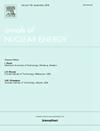Modeling of neutron fluctuations with temperature feedback using stochastic differential equations
IF 1.9
3区 工程技术
Q1 NUCLEAR SCIENCE & TECHNOLOGY
引用次数: 0
Abstract
Neutron fluctuations, also coined zero power noise, is concerned with the study of the random fluctuations observed in the neutron population evolving in a fissile medium, due to the fundamentally intrinsic stochastic nature of the neutrons’ interactions in matter.
The canonical theoretical modeling of such fluctuations rely on the establishment of a microscopic probability balance equation, from which one can extract, with the highest precision, all of the information about the stochastic behavior of the neutron population.
An approximate yet practical scheme has been gaining in popularity in recent years. It relies on a coarse grained approach of the problem, where the evolution of the neutron population is modeled through (Itô prepoint) Stochastic Differential Equations (SDE). In this simplified scheme, the crux is to find the SDE that best approximates the fluctuations of the underlying microscopic stochastic process.
In the present work, an alternative approach to the scheme usually found in the neutronics literature is proposed. A family of SDE that best approximate the fine grain behavior of the neutron population is derived from an explicit truncation of the translation operators found in the microscopic master equation of the problem. The approach is developed over a concrete and relatively original application case, namely that of the point reactor model including mono-energetic neutrons, one group of precursors, and a temperature feedback process.
求助全文
约1分钟内获得全文
求助全文
来源期刊

Annals of Nuclear Energy
工程技术-核科学技术
CiteScore
4.30
自引率
21.10%
发文量
632
审稿时长
7.3 months
期刊介绍:
Annals of Nuclear Energy provides an international medium for the communication of original research, ideas and developments in all areas of the field of nuclear energy science and technology. Its scope embraces nuclear fuel reserves, fuel cycles and cost, materials, processing, system and component technology (fission only), design and optimization, direct conversion of nuclear energy sources, environmental control, reactor physics, heat transfer and fluid dynamics, structural analysis, fuel management, future developments, nuclear fuel and safety, nuclear aerosol, neutron physics, computer technology (both software and hardware), risk assessment, radioactive waste disposal and reactor thermal hydraulics. Papers submitted to Annals need to demonstrate a clear link to nuclear power generation/nuclear engineering. Papers which deal with pure nuclear physics, pure health physics, imaging, or attenuation and shielding properties of concretes and various geological materials are not within the scope of the journal. Also, papers that deal with policy or economics are not within the scope of the journal.
 求助内容:
求助内容: 应助结果提醒方式:
应助结果提醒方式:


